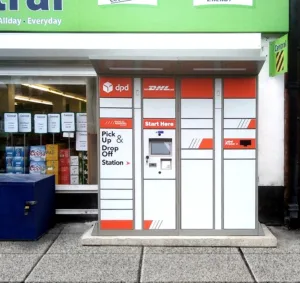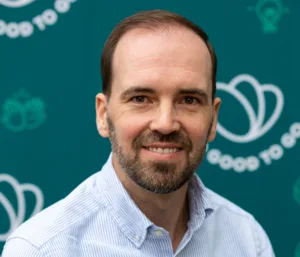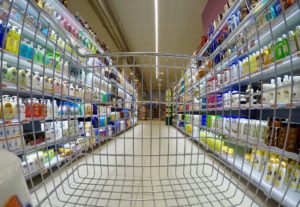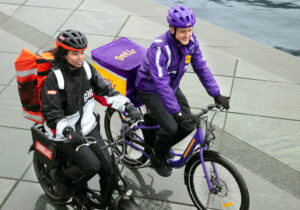Marketers must be brave and stand up for diversity, otherwise they are failing the very communities and customers they seek to serve.
That was the call to arms from Jerry Daykin, GSK EMEA media director, who kicked off day two of The 99//Club Digital Festival, a week long event tackling the theme of ‘Emerge Stronger’.
He told the virtual audience: “We’re in the middle of Pride month we’re in the middle of an unprecedented time with the Black Lives Matter movement, with trans rights under threat in the UK, and it’s really important to talk to you today about a sandwich.”
Normalising complex issues and debates
The sandwich in question was an M&S sandwich launched last year to celebrate Pride Month, and championed internally by the retailer’s internal LGTBQ+ group – yet it caused controversy when it hit the shelves with the LGTBQ+ group declaring it tacky and distasteful.
“I’m not here to judge them, but from a marketing perspective we need to stand by initiatives like this,” he said, adding that such products on high street shelves helped normalise complex and emotive issues and movements.
He also cited research from Procter and Gamble in the US that found 80% of respondents exposed to LGBTQ+ inclusive ads were more likely to be okay with a family member being gay themselves.
Daykin had been given just 99 seconds to get his point across before answering questions from the delegates on his theme. He is one of 99 senior marketers, agency executives and media owners speaking at the event over its five day span.
Don’t lose focus – even in times of crisis and cost-cutting
Following the backlash M&S had “really stepped away” from Pride this year, and he feared – particularly at a time of increased scrutiny on spend, that the diversity issue would be put on the back burner for fear of criticism.
“When resources are pushed, when efforts are pushed, diversity is sometimes seen as kind of a nice to have icing on the cake. And then it gets cut,” he added.
It would be telling over the coming months which organisations would keep that focus.
Yet it was incumbent on marketers to do so : “It is great that these things help make the world a better place, but the real reason for doing this is it is your job as a marketer to reflect the consumers around you – and if you think that all consumers are straight, white, middle class housewives then you are very, very wrong.”
The case for casual representation
Yet diversity in marketing need not be a headline-grabbing ad or initiative, it was also important to support diversity and equality across the spectrum, more of the time, both internally and externally. “You’ll get better work from a more diverse set of minds.”
He called for all brands to focus on “casual” representation. “Casual representation means that not every advert has to deliberately tell every story and be only about that story. Think about the ads you’ve produced over the last year or two and if they don’t show any black people or women in positive stereotypes or Muslim people then you have to ask if you’re doing enough to reflect your community or your consumers.”
The power of brands to make a positive difference was also the focus of Russ Wilson, partner at Hall & Partners.
Brands can drive the sustainability agenda
He said there were three groups of ‘actors’ who could influence the sustainability agenda: people, governments and business. Individuals did not alone have the influence to drive the systemic change needed; governments could take years – decades – to do so and were required to get consensus at every step. That left brands and businesses with the reach and ability to drive impact, he said, adding that many of the biggest brands had coffers far in excess of most countries.
“How can industry help, and how can this approach help our industries,” he asked. Unilever had proved that being purpose-driven will bring business-bottom line benefits, too.
Wilson cautioned that some brands would not be resilient enough, particularly during the Covid pandemic: “They won’t be able to pay the price but this is coming, sooner or later. There is no inherent right to exist as a business or a brand – and if you can’t sustain what you do then you don’t exist.”
Other hot topics on day two of The 99//Club Digital Festival were the importance of technology, the changing digital ecosystem, how we are failing tomorrow’s industry talent and why we must find new ways of working, which will be explored in future posts.
Speakers included Seb Bardin, Unilever global head of acquisition and marketing; Harvin Gupta, solutions engineer director, Xandr; Paul Frampton, president, EMEA of Control vs Exposed; Peter Markey, TSB CMO; Vodafone senior global brand and media manager Leonardo Oliveira and Valentina Torrusio, CEE data and productivity connections manager, The Coca-Cola Company.
The week-long invite-only festival is a collaboration between MAD//Fest and New Digital Age, and follows a success 99 Club event held earlier this year before lockdown. Over the course of five days 99 speakers are debating topics across themes including media and tech, customer experience and personalisation, brand experience and creativity and innovation for growth.










